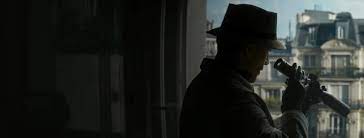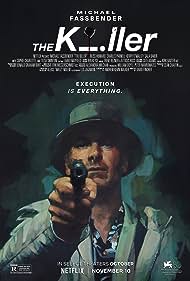Eye For Film >> Movies >> The Killer (2023) Film Review
The Killer
Reviewed by: Andrew Robertson

Indulging in similar typographic play as Lars Von Trier's Nymph()maniac, David Fincher's adaptation of a comic book might more properly be The K_.ller. That's at once a reflection of a felled target, a degree of encoding though it's probably not a Morse 'N', and a deliberate gap. There's no 'I' in team, but there's an off-kilter self in The Killer. "What difference does it make?" you might ask, but in what amounts to a revenge thriller set in the shadowy world of assassins for hire it's important to remember that an eye for an eye leaves the world blind.
Though there's a score by usual Fincher collaborators Trent Reznor and Atticus Ross, the soundtrack is full of Smiths songs. These are often diegetic, emerging from the headphones of our eponymous, anonymous, pseudonymous hit-man. With limited theatrical release most viewers will see it on streaming service Netflix. That will reward those using the pause button with one of the film's many less than serious details - the alternate identities adopted by Michael Fassbender's protagonist are drawn from American sitcoms. There's a Bunker, among other defensive architecture. A Howard Cunningham, after Ron's role as Richie in Happy Days. Deeper cuts too, among them the manager of The Partridge Family.

Technically a comic book movie, The Killer is based on a long running series by Matz (Alexis Nolent) and illustrated by Luc Jacamon. Much of Jacamon's almost laconic graphic style has been borrowed, especially the bucket hat, Hawaiian shirt and khakis costume of the protagonist. Matz also wrote the source for the Sylvester Stallone/Walter Hill film Bullet To The Head. The Killer was first published in France in 1998, with its first arc completing in 2014. The film covers similar territory to the first volume, though Andrew Kevin Walker's script makes significant changes to almost everything, to the point that those who have read the original (or more likely its translated reprint from Archaia Press) find their levels of recognition oscillate wildly.
The version Eye For Film saw had audio-descriptive subtitles, a boon for accessibility and for saving viewers from racking their memory if they think they've heard this one before. I've seen accounts that suggest Fincher was quite involved, to the extent that "Birds cooing" became "Pigeons coo," more definite, more direct. The film's action is too. Its humour though is more arch than Gothic.
Walker, who penned Se7en and 8MM was attached later. Initially it was Alessandro Camon pencilled in. He'd adapted Bullet To The Head. Though Walker's most notable works are bleak to the point of sleaze, The Killer is brighter, crisper, like Debbie in The Addams Family Values at home among sociopaths but distanced by pastels.
It's enough to say a job goes wrong. There's a long period of waiting before it, getting to know our protagonist through voiceover. I'm still not sure of it, I can only hope for a version without that inner monologue. I think it'd leave the film more open to interpretation, though as an adaptation it takes several liberties. The cultural references have been updated, moved transatlantic. There's a disassociation between the original's ennui and what might be the consequences of sleep deprivation. There's also a rebalancing of its violence, and it might be that which most discomfits.
By my count, and I've been over it a few times, more than half of the film's violence is meted out against women. Some of that isn't fatal, indeed notionally some of it is accidental. That's harder to justify when the film discards a full magazine when the source graphic novel filled pages with each bullet pointedly doing some collateral damage. While in each a plan is just about held to despite panic, the aftermath and pursuit is quite different. Winding a circuitous route while discarding evidence, it excitingly goes nowhere fast. It is a compelling escape, though at points the whine of the electric scooter reminded me more of Scalextric than anything else.
When our protagonist gets back to the old house it's not the Smiths that greet him but Portishead, signs of bloodshed, his girlfriend in a coma. That's the impetus for the revenge, the barbarism begins at home. In the outside world the killer might be half a person but in a minimalist mansion he can stretch out and wait. Magdala (Sophie Charlotte) is one of the few characters with a name, though how she's treated in the film is a marked contrast to the fate of Diva the dog. The Killer might act alone but Fassbender often does too, implacable in scenes with Charles Parnell, Sala Baker, Tilda Swinton, Arliss Howard, Kerry O'Malley, Gabriel Polanco.
Some of their fates are perhaps deserved. While pretty girls make graves I return to the gender imbalance of the violence. Fincher's no stranger to the lines between satirising and valorising crises of masculinity, from Fight Club to Zodiac. If anything the Killer sits between the two, though the frequency with which it destroys mobile phones does suggest it's also learned some lessons from The Social Network.
The presence of a pattern in the false identities belies anti-patterns elsewhere. A meditation on McDonalds is matched by a careful catalogue of car hire corporations. The killer's eyrie for his fatal task is a dead office space for a more and less corporate predator, WeWork branding a signal of a different kind of delusion. There are several kinds of puzzle, careful attempts to obfuscate evidence on both sides of the pursuit. The hand in glove that pulls the trigger on spray bottles and sniper rifles is the same that will paint a vulgar picture in blood at various distances. When he's not butchering others he's mangling quotes - one that "ought to be" Dylan Thomas is probably Henry Ward Beecher, if not St Jerome.
It's Santo Domingo in the Dominican Republic (doubly for the patron of astronomers, not that of archaeologists) that really starts the comparisons with James Bond. The comics do too, though there The Killer's family is different, the politics sufficiently distinct that he becomes director of an firm working (one assumes) with Hugo Chavez' era PDVSA to exploit an oil field in Cuban waters. This killer is far more personal, not Langley or Lubyanka but pot-stickers through PostMates.
Pattern is perhaps the root of it all. When I saw it the person in the ticket queue beside me asked for it not by name, but as "the new David Fincher". While its pace is sometimes deliberately measured, stately stalking still, another in the audience found it soporific, having to be roused by an usher after the credits. I myself left with questions unanswered, an uncertainty. It's that which makes me wonder if I'll find it more rewarding on a re-watch. The problem with seeing a film once is that I know it's over, but there's often a chance to go back, even if these things take time. One hesitates to call anything a cult classic on an initial viewing but I know that to tell The Killer "I'll probably never see you again" would be a miserable lie.
Reviewed on: 18 Nov 2023
















